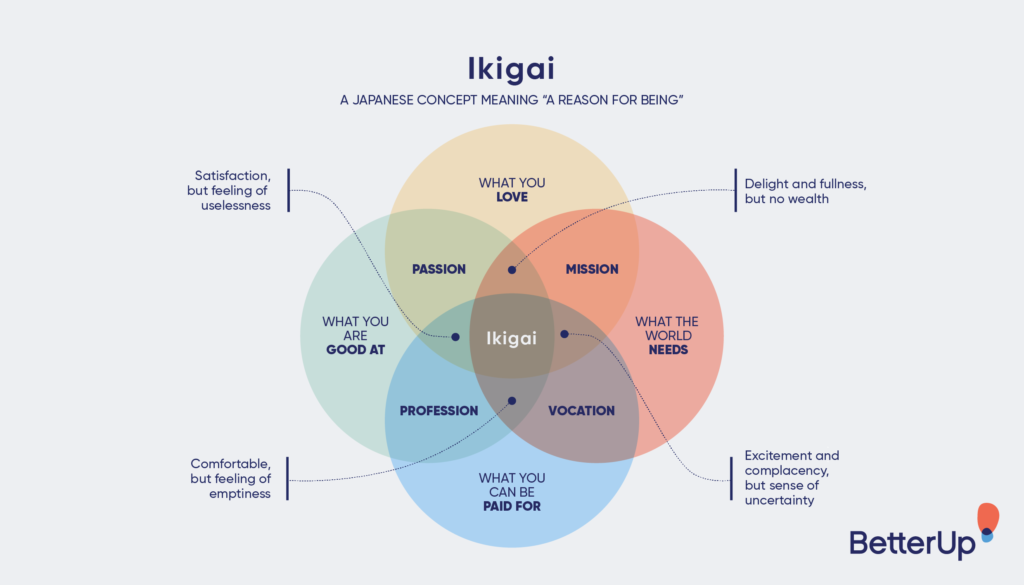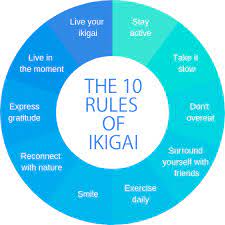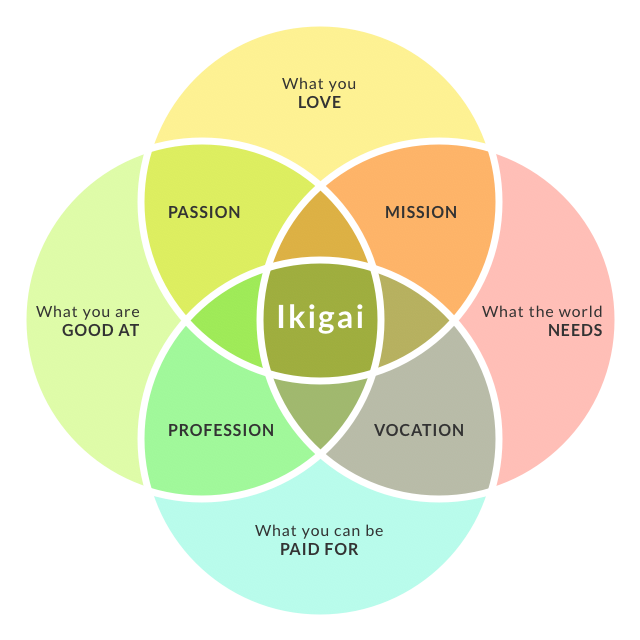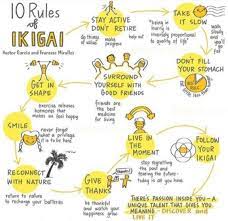The Japanese Technique To a Long and Happy Life by Héctor García and Francesc Miralles, is more of a case study on the lives of the long-living residents from Ogimi, a small village in Okinawa, than an explanation or guide to understanding Ikigai.
The book concludes with 10 ten rules of ikigai that the author’s distilled from the wisdom of these long-living residents. You could interpret the rules as the lifestyle habits that enable the senior residents of Ogami to live long and enjoy their ikigai
Your lifestyle will be very different to the centenarians of Ogami. You probably work, live in a city, have many responsibilities, financial stress, relationship problems and many things on your mind and so on. It may be hard for you to adopt all 10 rules, but some are very easy to implement.

1. Stay active; don’t retire.
“Those who give up the things they love doing and do well lose their purpose in life. That’s why it’s so important to keep doing things of value, making progress, bringing beauty or utility to others, helping out, and shaping the world around you, even after your“official” professional activity has ended.” (Japanese Technique)
2. Take it slow.
“Being in a hurry is inversely proportional to the quality of life. As the old saying goes, “Walk slowly and you’ll go far.” When we leave urgency behind, life and time take on new meaning.”
If you are in a hurry it incites that you are not in control and under stress. By taking things slow it means you are more mindful of your decisions, in control and more often than not doing the things you want to do. (Japanese Technique)
3. Don’t fill your stomach.
“Less is more when it comes to eating for long life, too. According to the 80 percent rule, in order to stay healthier longer, we should eat a little less than our hunger demands instead of stuffing ourselves.”
腹八分目に医者いらず – Hara hachi bun me ni isha irazu.
This Japanese proverb translates to ‘Eating to only 80% full keeps the doctors away’. Hara hachi bun me is a 2500-year old Japanese Confucian that means ‘stomach eight parts full’. You mostly hear Japanese just say ‘hara hachi bu” towards the end or on completion of eating a meal to indicate they feel almost full.
Think of hara hachi bun me as mantra that represents a form of wisdom-based calorie restriction that the Japanese have practiced for hundreds of years. You could say ‘Hara hachi bun me’ before or towards the end of your meal to remind you not to overeat. (Japanese Technique)
4. Surround yourself with good friends.
“Friends are the best medicine, there for confiding worries over a good chat, sharing stories that brighten your day, getting advice, having fun, dreaming . . . in other words, living.”
若い人たちはよく、「生き甲斐がない」といます。しかしそれは当たり前です。孤立した人には生き甲斐がない。生き甲斐とは人間関係です。
– 石川達三Young people often say “My life has no ikigai”. This is obvious. People who isolate themselves can’t have ikigai – meaning or purpose. Ikigai is only found in interpersonal relationships.
– Ishikawa Tatsuzō
The above quote highlights the importance of interpersonal relationships. Without relationships and friendships, we can’t experience connection, intimacy or love, nor can we share our joys, hopes, struggles, and fears.
When we consider that we now spend more of our time alone looking at screens than we do spending time with our friends, this rule acts as a reminder of the importance of friendship and all its benefits. Instead of looking through a social media feed, call an old friend and make a date to catch up. (Japanese Technique)

5. Get in shape for your next birthday.
“Water moves; it is at its best when it flows fresh and doesn’t stagnate. The body you move through in life needs a bit of daily maintenance to keep it running for a long time. Plus, exercise releases hormones that make us feel happy.” (Japanese Technique)
6. Smile
“A cheerful attitude is not only relaxing – it also helps make friends. It’s good to recognize the things that aren’t so great, but we should never forget what a privilege it is to be in the here and now in a world so full of possibilities.” (Japanese Technique)
7. Reconnect with nature
Though most people live in cities these days, human beings are made to be part of the natural world. We should return to it often to recharge our batteries.
“Are you familiar with the Japanese word shinrin-yoku. It translates to ‘forest bathing’ and means connecting with nature using the five senses of sight, hearing, taste, smell, and touch. It is a mindfulness practice to help you reconnect with nature so that you can rejuvenate the body and give the mind a moment of peace.” (Japanese Technique)

8. Give thanks
“To your ancestors, to nature, which provides you with the air you breathe and the food you eat, to your friends and family, to everything that brightens your days and makes you feel lucky to be alive. Spend a moment every day giving thanks, and you’ll watch your stockpile of happiness grow.” (Japanese Technique)
9. Live in the moment
“Stop regretting the past and fearing the future. Today is all you have. Make the most of it. Make it worth remembering.”
From the moment we wake up to the time we fall asleep we are constantly running an internal dialogue with ourselves. Our mind jumps from one worry to another and we forgot to be aware, present, mindful and alive in each moment. (Japanese Technique)
Eckhart Tolle summed it up best in his book, The Power of Now, when he wrote :
“The present moment is all you ever have. There is never a time when your life is not ‘this moment.’ Is this not a fact?”
– Eckhart Tolle
10. Follow your ikigai
“There is a passion inside you, a unique talent that gives meaning to your days and drives you to share the best of yourself until the very end. If you don’t know what your
ikigai is yet, as Viktor Frankl says, your mission is to discover it.”
I think the authors got it wrong with this last rule. Your ikigai doesn’t have to be one unique talent that drives you to share the best of yourself until the very end. This contradicts the Japanese perspective of ikigai. Japanese author, Ken Mogi describes ikigai as a spectrum, and that you can have several ikigai, anything from enjoying your morning coffee to working towards a life-defining goal. (Japanese Technique)
‘Ikigai does not come from a single value system. It is not written in the orders of God. It comes from the rich spectrum of a spectrum of small things, none of which serves a grandiose purpose in life.’
I think we could change the last rule to ‘Develop a Sense of Purpose’.





